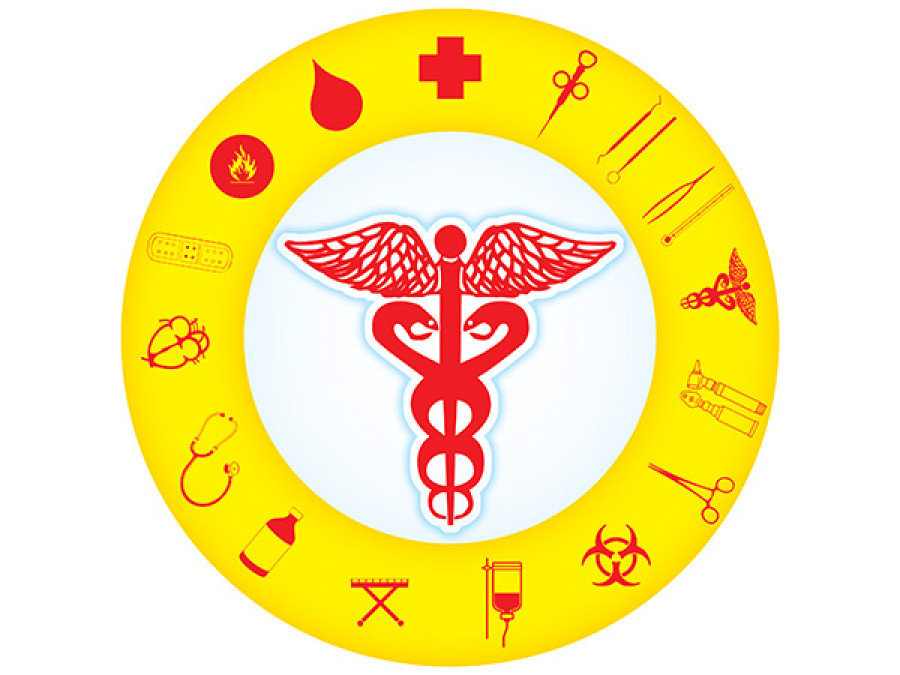Opinion
Physician, heal thyself
Test preparation centres for medical entrance exams need to be brought under government scrutiny
Arun Bhattarai
Recent news of the leakage of entrance test questions for MBBS scholarship offered by Ministry of Education has surprised Nepalis at home and abroad. News of bribery, manipulation and ethical infraction in Nepal’s academia is not new. But what happened in Golden Gate International College has definitely has caught the eye of Commission for Investigation of Abuse of Authority (CIAA). Following the arrest of teachers of Golden Gate and other intermediaries for their alleged involvement in leaking entrance questions in exchange of huge palm-greasing, the CIAA has interrogated and taken many people under custody for further investigation. More recently, the director of National Academy for Medical Education (Name), the pioneer test preparation centre for MBBS entrance exam, more often known by its acronym, has been arrested in the alleged connection with the group involved in the case. This I believe is only the tip of the iceberg and that many more underlying characters and stories will soon emerge.
Old problem
At the dawn of new millennium I was also a student at Name with doctoral aspirations. Soon after its striking commercial success, new players entered into the lucrative market. All of these test centres used marketing gimmicks as if they were the birthing centres of all future doctors of Nepal. As the country continued to produce thousands of +2 graduates in Biology every year, those in the top percentile continued to pursue their medical dreams by enrolling in one of these centres. Parents either had little or no knowledge if the enrollment was necessary enough or were easily duped by the advertisement.
Government scholarships and subsidised quotas aside, private colleges even became the battleground to get into the programme. Consequently, China, Philippines and Bangladesh became the alternate haven to most of those could not get into home institutions inviting new businesses, the so-called counselling centres. These businesses racked in millions of rupees. The Education Ministry did not care to monitor them at all.
In recent years, both foreign educated and products of domestic institutions have failed to make it through the licensing exam conducted by the Nepal Medical Council. It was reported that some of these examinees have failed in subsequent attempts only to raise questions about their credentials. The Education Ministry did not again find the need to intervene both in policy and operational matters as to what should be the right course of action for medical education in Nepal.
Occasional hunger strikes by Dr. Govinda KC, the good samaritan at Tribhuvan University Teaching Hospital demanding the stopover order on the licensing of new medical schools in the country have only met with the last minute verbal assurances from the government that the matter will be looked into. And weeks and months pass by before Dr. KC announces new rounds of protest. No one knows what is going on among politicians, bureaucrats and promoters of new colleges that the government does not have the guts to make things right.
Medical College Acceptance Test
While the recent incidents point toward the need to build a robust framework on how these exams are carried out—from how the subject experts are chosen to prepare questions to where the papers are printed to how the exams are conducted—we must look into the root causes of the problem.
In the immediate, the ubiquitous presence of test preparation centres, especially those for all types of medical entrance exams need to be brought under government scrutiny. Secondly and most importantly, the authorities in Nepal should adopt a common medical entrance exams such as Medical College Acceptance Test (Mcat) adopted by American and Canadian Colleges and Universities and have the test administered by a third party. This would dissociate government officials, private colleges where tests are administered and all intermediaries—freelancer teachers to test prep centres—and shun all sneaky practices. Even after institutionalising an international test like the Mcat, one could still question where those tests actually take place. To ensure that there are no short-cuts or under table deals at the test centres, the government can ask international test centres like those of Pearson or British Council to be the sole administers through a transparent bidding process.
When doctors and nurses speak common languages of diagnosis and treatment everywhere in the world, why not we adopt a common examination that tests prospective candidates in the areas of problem solving, critical thinking, and knowledge of scientific concepts and principles. By having an international test exam like Mcat, we would not only make our future doctors at par with those produced by the west but also improve the quality of medical education in the country. To ensure that candidates have knowledge of home issues, language, laws and regulation, a supplemental test can be administered.
Independent body
An alternative to the Mcat model would be to form a separate independent entity that focuses on year long research in social, physical and natural sciences. This entity would research, develop and administer all entrance exams required for undergraduate and graduate admission in all disciplines. Colleges and universities will determine as to what are their requirements and accept candidates with merit-based scores.
It is no brainer that medical education is one of the most rigorous courses of study and only the brightest students should gain entry regardless of their background. As reservations or quotas make the system vulnerable to under performance and exploitation, the government and concerned authorities should at least require a minimum score from Mcat so that the virtues of competition and excellence prevail even when reservation is necessary.
Finally, the government must book those allegedly involved in the shameless act of bribery and manipulation to the full extent of the law and leave no stone unturned in punishing everyone involved. If institutional involvement is verified, authorities must revoke business licenses and academic authorisation.
Bhattarai is vice-president of Vision for Nepal Foundation, Washington DC, the US




 14.24°C Kathmandu
14.24°C Kathmandu











